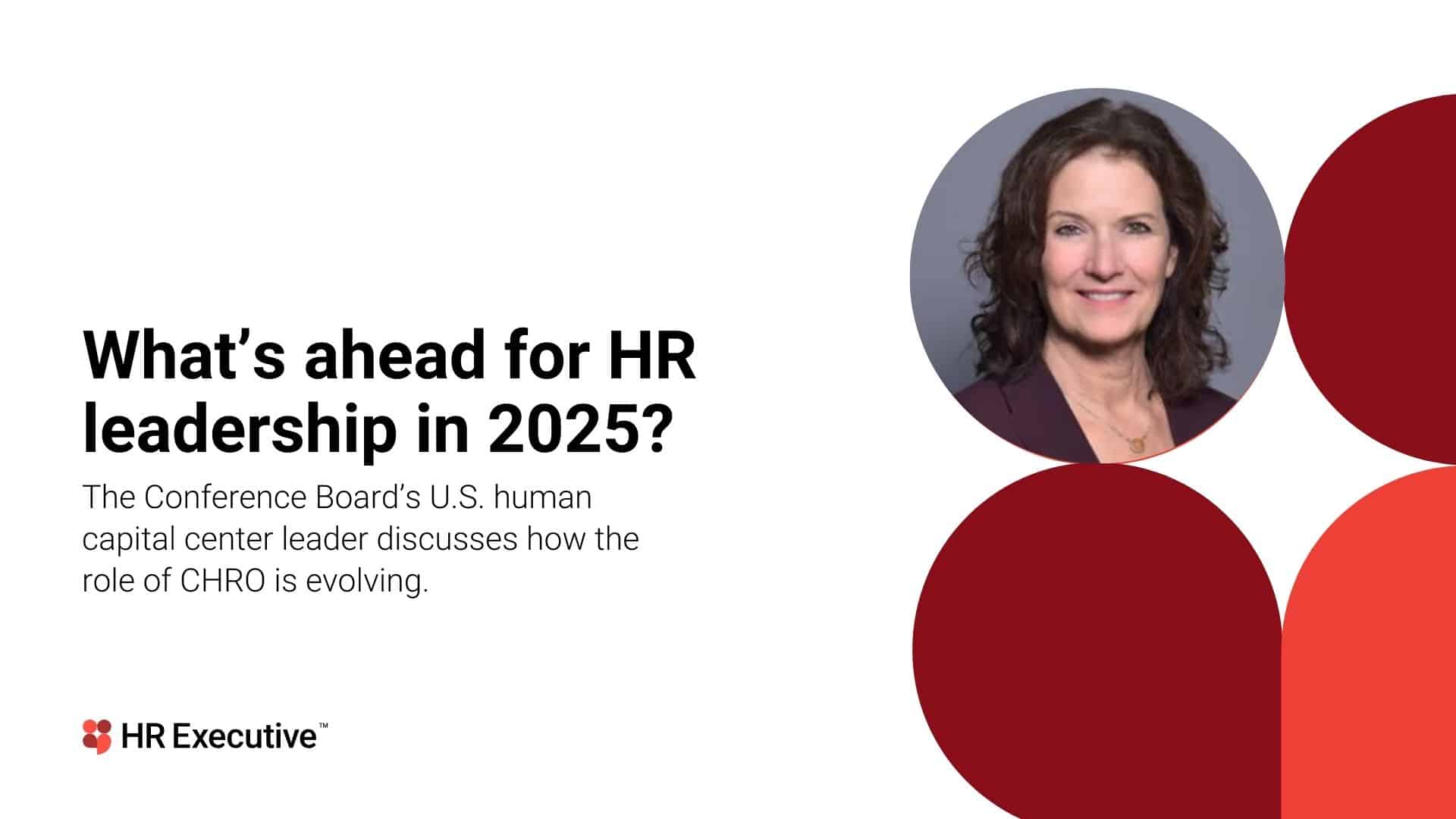
CHROs may want to brace themselves for a challenging environment heading into 2025, as a number of trends will continue to unfold in the New Year that will test their HR leadership skills, experts say.
From demands for transformation and the integration of AI to evolving landscapes for hiring and DEI, HR leaders will face an environment rife with change and uncertainty, says Diana Scott, U.S. human capital center leader for The Conference Board. (Scott recently sat down with HR Executive for a video interview on HR leadership trends in 2025. Click here to view the video.)
In the backdrop exists an environment where domestic and global conflict are on the rise, along with economic uncertainty, and organizations continue to grapple with new ways of working and persistent change fatigue, adds Brad Bell, director of the Center for Advanced Human Resource Studies and a strategic HR professor at Cornell University. Both experts say HR leaders can respond to these challenges by leaning into a strategy that is closely aligned with business objectives, an approach that will emphasize the increasingly critical nature of the HR function to the business.
4 HR leadership trends for this year
HR transformation
Although HR leaders have long been tasked with transforming their departments, this work will become even more weighty for HR executives in the New Year.
“It feels a bit more significant now because these transformations they’re undertaking aren’t just around the margins,” Bell says. “They’re now thinking about, how do we rethink the HR operating model given AI and technology? How do we rethink HR in the context and focus of increasing productivity and reducing costs?”
Many HR leaders are working on their organization’s digital transformation to modernize both the mindsets and systems within their companies to build successful workplaces of the future.
This focus on digital transformation is even changing titles for some HR leaders, Bell notes.
“I’ve seen some CHROs with the expanded title of transformation officer,” says Bell. “Some are picking up the technology piece because HR is often an early adopter of some of these AI tools and technologies. They are the testing ground for technologies before rolling it out more broadly to other parts of the organization.”
AI’s influence on the workforce
Both Bell and Scott note AI will continue to influence HR leaders’ focus in 2025.
For starters, AI and technology will be key drivers of successful transformation, Bell says. And Scott notes AI integration provides another platform for HR executives to take leadership roles.
“HR leaders have an opportunity to step up and really lead their organizations with their AI transformation,” she says.
However, Scott warns HR leaders are too often focused on the short-term impact of AI and need to take a long-term approach next year. For instance, some HR teams are using gen AI for hiring, such as to assist in writing job descriptions, but a longer-term strategy may also include skills assessments as AI redefines jobs and roles, Scott notes.
She advises HR leaders to pilot individual AI implementations to see their impact on the organization versus tackling everything simultaneously.
Challenging dynamics for attracting and retaining talent
Attracting and retaining talent will be more difficult in 2025 as HR leaders navigate a tight labor market, Scott says. She notes low unemployment, an economy that will likely remain strong in the New Year, and continued job growth all translate into a tough hiring landscape for 2025.
For instance, many CEOs want their workforce in the office full-time, which most job candidates and employees are resisting. There is also an increasing number of organizations dismantling or reducing their commitment to DEI, both of which can make an employer less attractive to prospective candidates and current employees, experts say.
A quieter stance on social issues
While many employers ramped up DEI work after the 2020 death of George Floyd, more recently there’s been significant “backtracking,” Bell says, “where companies are now only going to address issues that are impacting the company and employees.” He adds that CHROs will need to work with CEOs and boards of directors to decide when and how to respond to societal issues.
“With George Floyd’s death, it was something that everybody could agree with that we’re opposed to,” Bell says. “But now, other issues have bubbled up where it’s become difficult for employers to be vocal because employees may have very different viewpoints.”
Navigating DEI issues will become even more difficult in 2025 as more Gen Z employees enter the workforce. This is a generation known for wanting their employer to have a strong voice on social and political issues, Bell says. And this segment of the workforce is crucial for employers in a tight labor market, given Gen Z will account for 27% of the workforce in 2025.
The future of HR leadership beyond 2025
Over the next five years, HR leaders will continue to become key strategists and advisors to their CEO and the board of directors, says Scott.
This will be fueled, in part, by the ongoing change environment, she adds. As factors like the economy, social movements and new employee expectations reshape talent attraction and retention, HR’s work will grow increasingly more complex.
“CHROs are going to be the ones that are tapped to help the organization figure all that out,” Scott says.
Related: Read more about how HR leaders can prepare for the year ahead.
